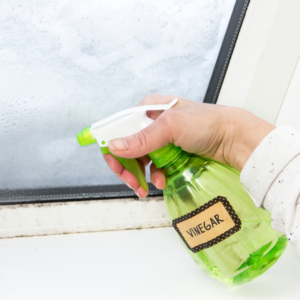Vinegar, a staple in many households for its culinary uses and cleaning properties, has earned a reputation as an odour eliminator. It’s often touted as a natural and effective solution for banishing unpleasant smells from our homes. But does vinegar truly possess the power to eliminate all odours, or is this just another cleaning myth? In this blog, we’ll delve into the science behind vinegar’s odour-fighting capabilities, its limitations, and alternative solutions for a fresher living space.
The Science of Vinegar
Vinegar’s ability to combat odours is attributed to its acidic nature. It typically contains acetic acid, which can help neutralise and mask certain odours. The idea is that when vinegar is used, it may either break down odour molecules or react with them to reduce their potency.

What Vinegar Can and Cannot Do
- Effective on Some Odours: Vinegar can be quite effective at neutralizing and eliminating certain odours, especially those caused by common culprits like food, smoke, or pet accidents. Its natural acidity can help break down the odour molecules and mask the smell.
- Natural Disinfectant: Vinegar’s antibacterial properties make it a suitable choice for tackling odours caused by bacteria or mould. It can help eliminate the source of the smell and prevent its return.
- Ineffective on Others: While vinegar works well on many odours, it may not be as effective on some, particularly those associated with strong chemical or organic compounds. For instance, it might struggle to eliminate the smell of certain chemicals, rotting food, or sewage.
- Temporary Solution: In some cases, vinegar may mask an odour temporarily, but it might return once the vinegar’s scent dissipates. This is especially true if the source of the odour is still present.
Safety Considerations
Before using vinegar to combat odours, it’s essential to consider safety:
- Avoid Mixing with Bleach: Never mix vinegar with bleach or products containing bleach, as this can produce toxic fumes. Always use vinegar separately from other cleaning products.
- Ventilation: When using vinegar for odour elimination, ensure proper ventilation to dissipate the vinegar scent.
Alternative Odour-Eliminating Solutions
While vinegar can be a handy tool for certain odours, it’s not the only solution in your arsenal. Consider these alternative methods for tackling unpleasant smells:
- Baking Soda: Baking soda can be sprinkled on carpets, upholstery, and in shoes to absorb and neutralise odours. Leave it in place for a few hours or overnight and then vacuum it up.
- Activated Charcoal: Activated charcoal can absorb a wide range of odours and is often used in air purifiers and deodorisers.
- Air Purifiers: High-quality air purifiers equipped with HEPA filters can effectively remove airborne particles, including odours, from your indoor air.
- Essential Oils: A few drops of essential oils like lavender, eucalyptus, or citrus can be added to a diffuser or mixed with water and used as a natural air freshener.
- Professional Cleaning: For persistent odours that resist DIY methods, consider professional cleaning services that specialise in odour removal. Contact The Naturally Clean Co to help tackle any tough or stubborn areas.
While vinegar is a versatile household item with many practical uses, it’s essential to recognise its limitations when it comes to odour elimination. It can be effective for some odours, but not all. Understanding the nature of the odour and the source behind it is crucial for selecting the right odour-fighting method. Vinegar is just one tool in your arsenal, and for more challenging or persistent odours, alternative solutions may be necessary. By combining the right methods and choosing the most appropriate solution for the specific odour you’re dealing with, you can enjoy a fresher and more pleasant living environment.
You can check out our blog on other cleaning myths here.

